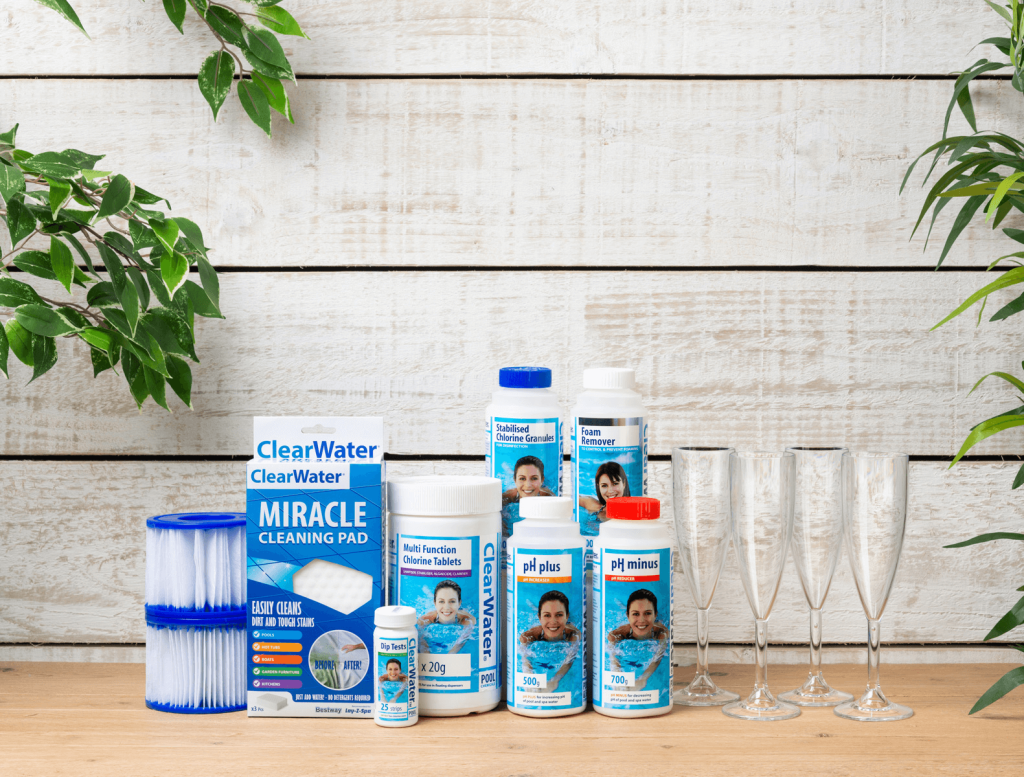The question of what chemicals I need to take care of in a hot tub arises from beginners and experienced users who want to optimize costs and reduce the number of chemicals. It is challenging because there are various products, from chlorine sanitizers to foam reducers.
So, which hot tub chemicals should I choose, and which ones are a waste of money? To answer this question, we took into account our 10+ years of experience in the hot tub industry, read user reviews, and selected nine hot tub chemicals that will make the process of hot tub care straightforward.
What Hot Tub Chemicals Do I Need?
To understand what you need, it is worth knowing what chemical levels are. So, chemical levels are the concentration of certain substances in the hot tub water. Perhaps the most important are:
- free chlorine;
- pH, alkalinity, and acidity;
- calcium hardness;
- cyanuric acid.
You will learn more about them later in the article. Now, you can get acquainted with the list of chemicals that every hot tub owner needs.
| Chemical | Purpose |
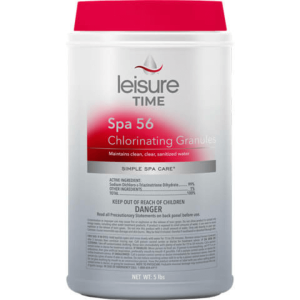 Chlorine sanitizer | Chlorine sanitizer is a chemical that destroys harmful organics (e.g., bacteria) and makes your water safe to use. Jump to the detailed review |
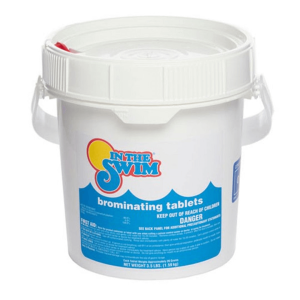 Bromine sanitizer | The purpose is the same as for chlorine sanitizer. However, the active substance here is bromine (sometimes bromine + chlorine). It's safer on the skin but works up to 240 times slower! Jump to the detailed review |
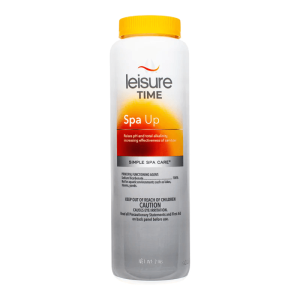 Alkalinity and pH increaser | Low alkalinity and pH mean that the water in the hot tub is highly acidic. This causes green water, rapid chlorine consumption, and corrosion, so you increase the alkalinity and pH levels. Jump to the detailed review |
 Alkalinity and pH decreaser | High alkalinity and pH mean that the water contains a lot of alkalis. This causes chlorine build-up, cloudy water, damage to the lining of the hot tub, and eye and skin irritation, so you lower alkalinity and pH levels. Jump to the detailed review |
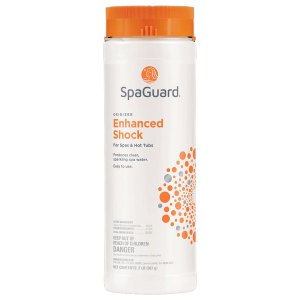 Hot tub shock | Shock is necessary for the one-time elimination of many bacteria and algae. However, you can use it regularly to keep the water clean and safe. Jump to the detailed review |
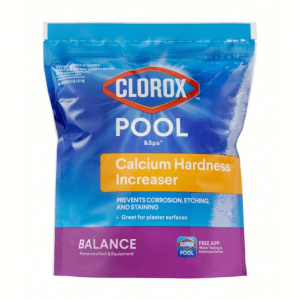 Calcium hardness increaser | Low calcium hardness means a lack of calcium in the water. This causes corrosion processes and spoiling of equipment and linings. Jump to the detailed review |
Can I Use A Hot Tub Without Chemicals?
It is impossible to use a hot tub without chemicals because the water will become unusable. Here are four reasons why you should not neglect chemicals.
 Evaporation | Water contains various chemicals, salts, minerals, and metals. During evaporation, they settle on the hot tub surface and inside the equipment. If you do not eliminate the sediment, stains and scale will appear in 99%. They can clog filters or tubes, so jets and pumps will fail, and the water will eventually turn cloudy or green (due to high acidity or alkalinity). |
 People | Skincare products, sebum, skin particles, and so on are bound to enter the water, causing pollution. Moreover, bacteria feed on this to increase their population, which can cause the water to become unusable. Therefore, you need to sanitize the hot tub water. |
 Environment | It doesn't matter whether your hot tub is indoors or outdoors – garbage will get into it. Dust, pollen, dirt, insects, and so on will cause the water to deteriorate and bacteria to multiply. In this case, you should use chemicals and buy a hot tub cover. |
 Heating | One of the main distinguishing features of a hot tub is the ability to soak in hot water. As you know, warm water is a favorable breeding ground for bacteria that will get into the tub from your swimwear, skin, and the environment. If you do not use chemicals, they will multiply rapidly, and the water will become hazardous to health because there is a risk of infection. |
How to Use Them and How Often to Add?
Each chemical has a different composition, so the frequency of its use may vary. Below we provide a table in which we indicated how often, at what dosage, and until what point each of the chemicals should be added.
 Chlorine sanitizer Frequency of use Every two to four weeks | Dosage Usual chlorination: ½ oz per 500 gallons | How to use Clean hot tub surfaces and filters → check and adjust pH → add sanitizer → wait for 5 minutes → check active chlorine level (should be 2–3 ppm). Goal 2–3 of Jump to the detailed review |
| Super chlorination: 1 oz per 500 gallons | ||
 Bromine sanitizer Frequency of use Every five to seven days | Dosage ¾ oz per 500 gallons | How to use Add sanitizer to the dispenser → run the pump for 12–24 hours → check bromine and active chlorine level Goal 2–3 of 3–5 of bromine Jump to the detailed review |
 Alkalinity and pH increaser Frequency of use After testing pH levels if needed | Dosage 6.8 < 7.2: 1 oz per 500 gallons < 6.8: 2 oz per 500 gallons | How to use Add pH increaser → turn on the pump for 1–3 hours → test water to match 7.2–7.6 Goal 7.2 < 7.6 80–120 ppm alkalinity Jump to the detailed review |
 Alkalinity and pH decreaser Frequency of use After testing pH levels if needed | Dosage > 7.6: ¼ oz per 500 gallons | How to use Add pH decreaser → turn on the pump for half an hour → test water to match 7.2–7.6 Goal 7.2 < 7.6 80–120 ppm alkalinity Jump to the detailed review |
 Hot tub shock Frequency of use Once a week | Dosage 1.5 oz per 500 gallons | How to use Test water and adjust pH to 7.2–7.6 → add shock when the hot tub isn’t used → turn on the pump → spread it across water surfaces Goal 2–3 of Jump to the detailed review |
 Calcium hardness increaser Frequency of use After testing pH levels if needed | Dosage To raise on 50 : 4 oz per 500 gallons To raise on 60 : 4.8 oz per 500 gallons To raise on 80 : 6.4 oz per 500 gallons | How to use Divide the total amount of chemical into three parts → do not pre-dissolve it in water → add each part at 6-hour intervals Goal 120–225 of Jump to the detailed review |
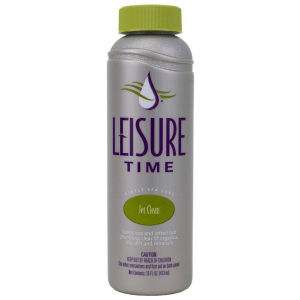 Jet cleaner Frequency of use Twice a month | Dosage 3 oz per 150 gallons | How to use Add cleaner before the hot tub is drained → turn the pump and jets for 15 minutes → turn off them and left the hot tub for an hour → turn the pump and jets for 15 minutes → drain and refill the hot tub Goal Clean water from jets Jump to the detailed review |
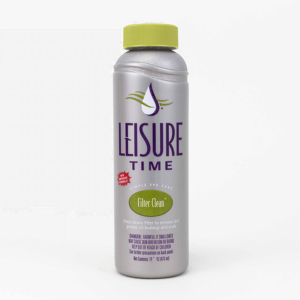 Filter cleaner Frequency of use Once a month | Dosage 32 oz per 110 sq of filter | How to use Add 6 oz to 4 gallons of water → soak filter the overnight Goal Clean filters Jump to the detailed review |
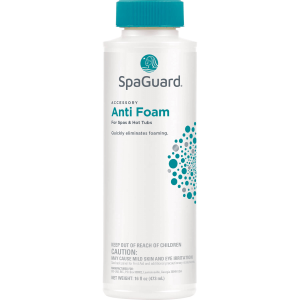 Antifoam Frequency of use Can be added each time when a hot tub is used | Dosage ⅕ oz per 200 gallons | How to use Add to the water when the pump is running Goal No foam Jump to the detailed review |
Extended List Of Required Hot Tub Chemicals
Earlier, we briefly mentioned six essential chemicals that will allow you to maintain your hot tub efficiently. Now it is necessary to describe in more detail why you need them and when you should use them.
Also, in addition to those six options, you may need three other chemicals that will keep jets and filters clean and effectively eliminate foam.
Let’s move on to the review.
Chlorine & Bromine Sanitizers
Sanitizer is one of the most crucial chemicals in hot tub maintenance. You should use it to eliminate bacteria that make water unsafe. There are two types of sanitizers you can use: chlorine and bromine.
Long story short, chlorine-based sanitizers are a faster way to purify hot tub water, and bromine-based sanitizers are a safer option. A more detailed comparison is below:
 Chlorine sanitizer |  Bromine sanitizer |
|
| Cleaning rate | From 5 minutes to 1 day | 12–24 hours |
| Economy | 1–2 oz per month | 3–4.5 oz per month |
| Warnings | May cause foul odor or rashes | None, safe for skin |
Also, we combine these indicators with the user ratings from and get the following results:
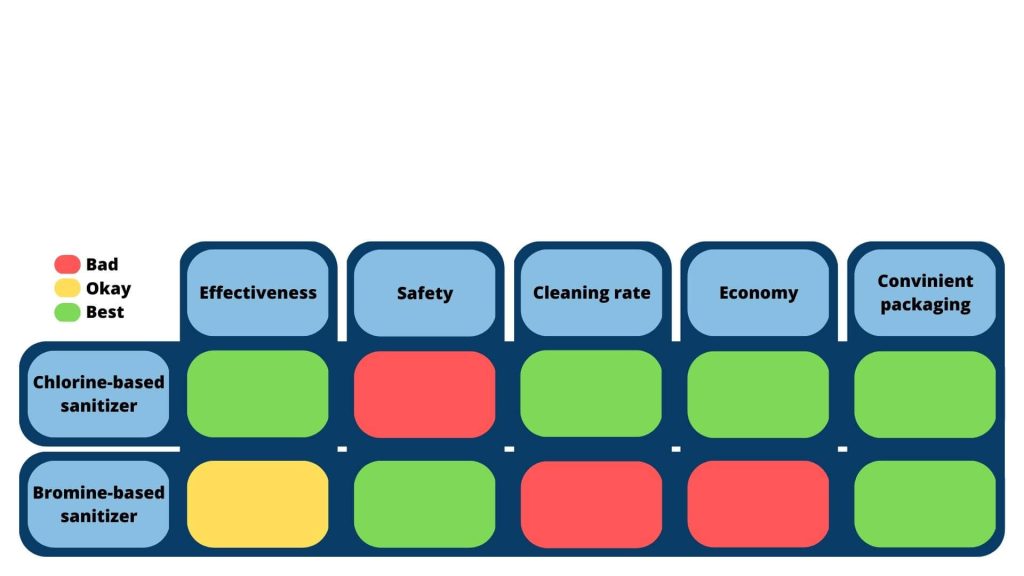
Indeed, Leisure Time Spa 56 Chlorine Sanitizer works up to 240 times faster and requires 1.5–4.5 times less chemical than Bromine sanitizer. However, In The Swim Bromine Sanitizer is better for people with sensitive skin or even children:
“It feels much nicer to my eyes and skin. What’s more, my son has sensitive skin, but the bromine didn’t cause any irritation.”
— Amazon user
Also, In The Swim Bromine Sanitizer comes in the form of tablets that you can put in a dispenser for a slow release of chemicals.
🥇 Leisure Time Spa 56 Chlorine Sanitizer is a quick and effective way to kill bacteria. However, you need to wait between 30 minutes and 24 hours, depending on whether the chlorination was usual or super, so that your skin and mucous membranes do not become irritated.
🥇 In The Swim Bromine Sanitizer is a slower but safer way to kill bacteria that is ideal for people with sensitive skin.
Alkalinity & PH Adjusters
If you don’t adjust the pH, you shouldn’t try adding other chemicals. To determine why this is so important, you should understand what pH is. Simply put, pH is an acidity measure of aqueous solutions. This indicator is measured on a scale from 0 to 14.
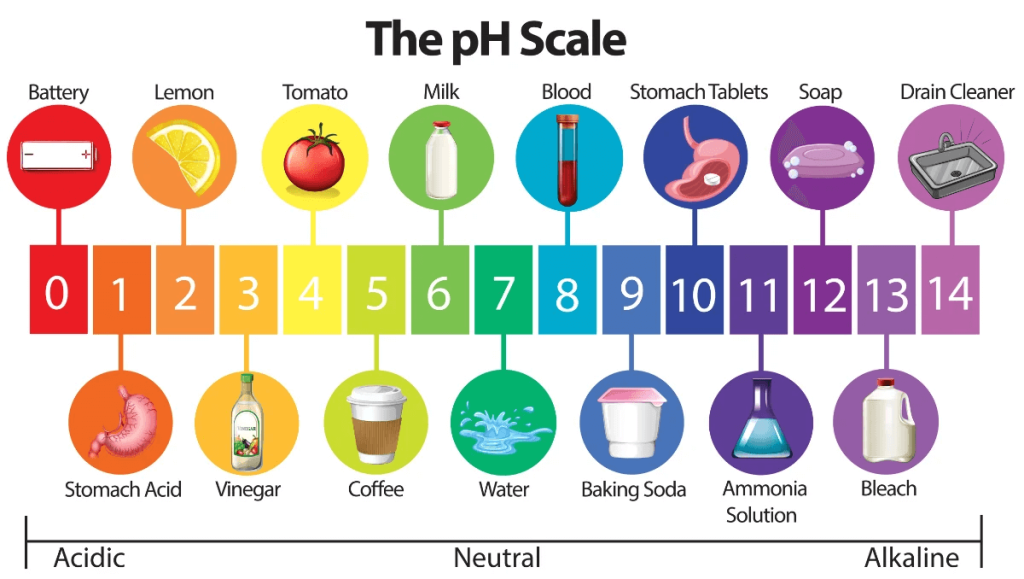
The distilled water we drink has a pH of 7, but the water in the hot tub should not meet this level. You should adjust the pH between 7.2 and 7.6. But what if my pH levels are not adjusted? Then you risk getting the following consequences.
| Chemical |  Leisure Time Spa Up |  Leisure Time Spa Down |
| Reason to use | pH < 7.2. Such water becomes too acidic due to an overdose of chemicals and threatens to corrode equipment, gradually destroy the hot tub, make chemicals ineffective, and irritate the skin. | pH > 7.6. Such water becomes too alkaline because you use the hot tub often or the equipment does not properly work. It threatens the appearance of sediment on the surface and equipment, the rapid development of bacteria, the ineffectiveness of chemicals, and irritation of the mucous membranes. |
Alkalinity is related to pH levels, and its increase/decrease is directly proportional to the increase/decrease in pH. Long story short, pH states for acidity while alkalinity is an ability to neutralize acids (pH decreasing increases acidity while pH and alkalinity increasing decreases acidity). Therefore, you may come across chemicals that regulate these levels together.
Hot Tub Shock
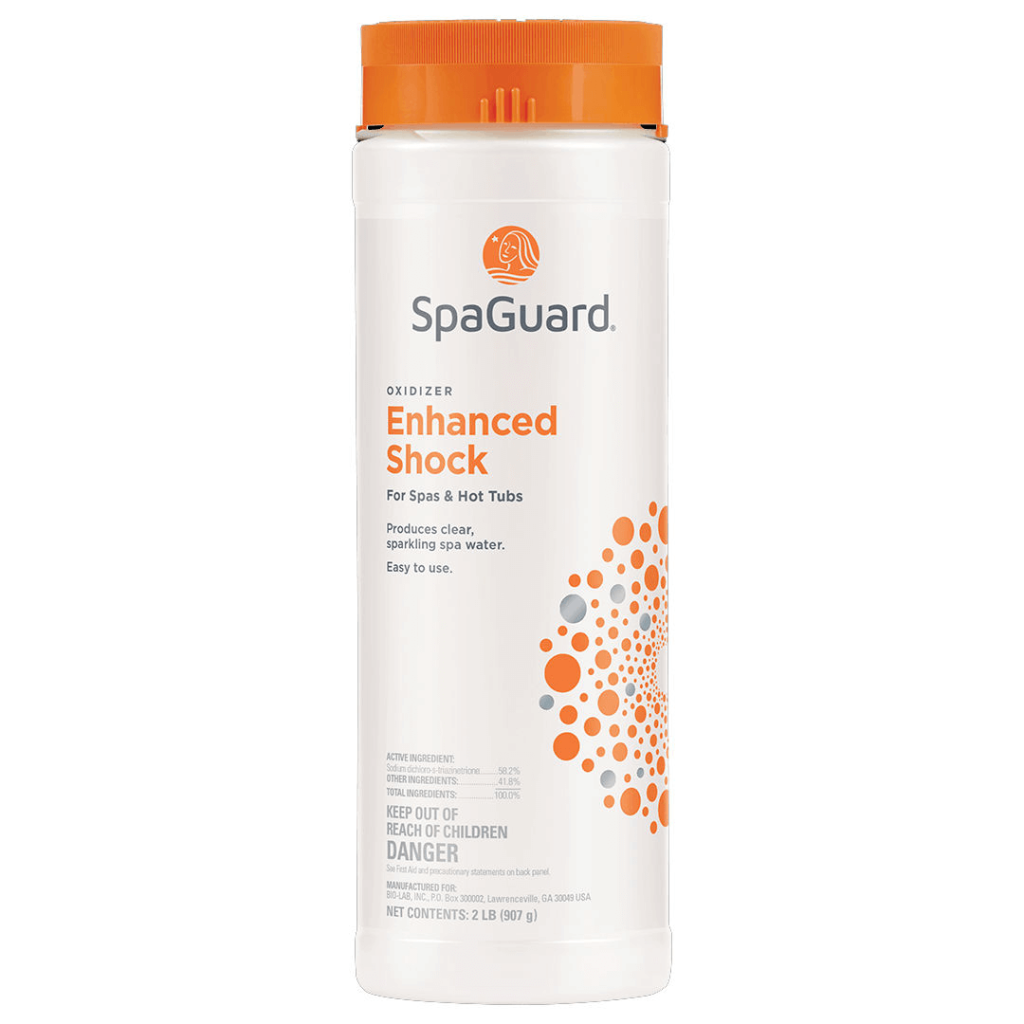
We’ve already used a sanitizer to kill bacteria, so we don’t want to have a chlorine overdose, and we can refuse shock, right? Not really, as you should shock the hot tub regularly to reanimate the chlorine or bromine.
Over time, chlorine loses its disinfectant properties, and hot tub shock re-turns it into active chlorine, which is released when it interacts with hydrochloric acid. Also, shock activates bromine to turn it from a common chemical element into a disinfectant. You should use a hot tub shock once a week so that your chlorine or bromine doesn’t become useless and cause the pH to rise.
Calcium Hardness Adjuster

Each review of hot tub chemicals you need starts with describing pH adjusters, sanitizers, shocks, etc. Less attention is paid to calcium hardness, but this is a crucial indicator.
Lack of calcium hardness is a problem because it means that the water is deficient in minerals. For this reason, water begins to take minerals from other places and literally corrode the hot tub surface, equipment, and so on.
Therefore, you need to test calcium hardness levels every week, and if they are below 120–225 ppm, add Clorox Pool&Spa Calcium Hardness Increaser. This chemical is also 🥇 in our because almost 100% of users report its effectiveness.
Jet & Filter Cleaners
 Leisure Time Jet Clean |  Leisure Time Filter Cleaner |
Jet and filter cleaners are not the most obvious chemicals to help you with your hot tub maintenance. However, you should know about them.
- Jet cleaner. Nozzles are hard-to-reach places where dirt or sediment can accumulate and cause levels to be off. Moreover, the sediment can clog the tubes and fail the massage system. Therefore, twice a month, you should add the jet cleaner to your hot tub.
- Filter cleaner. A dirty filter will spoil the water, so you should change it. However, buying a new filter every time is expensive. Therefore, you can use filter cleaner, which will cost eight times less than new filters and allow you to clean up to 53 filters.
Anti Foam
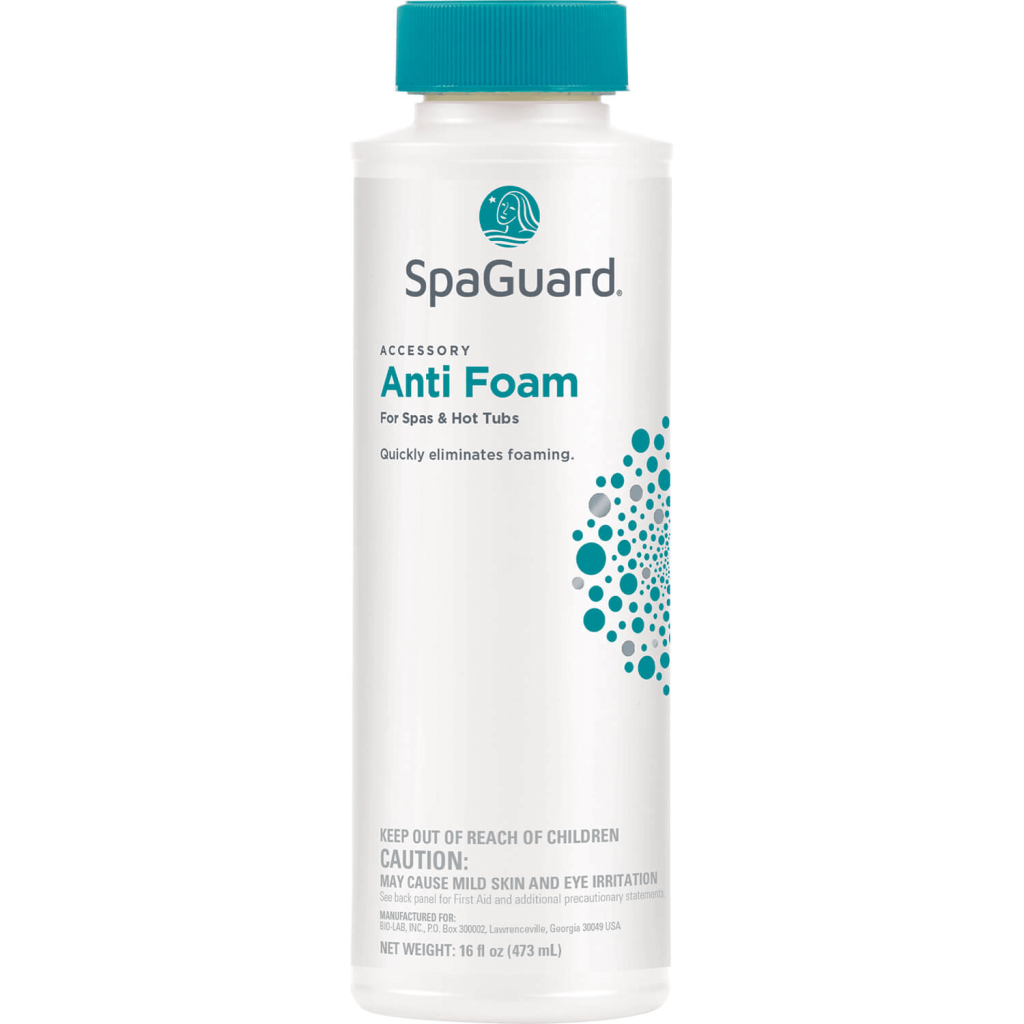
At first glance, it may seem that foam is not a problem. However, if you turn the jets in a hot tub filled with foam, there will be too much foam, and it will start to squish.
Pure water has good surface tension, so there is no foam. However, when you add chemicals, hair and body care products, and soap to it, the tension weakens, so foam appears. In this case, you can add a defoamer, which improves the water tension and eliminates unwanted foam.
Correct Order To Add Hot Tub Chemicals
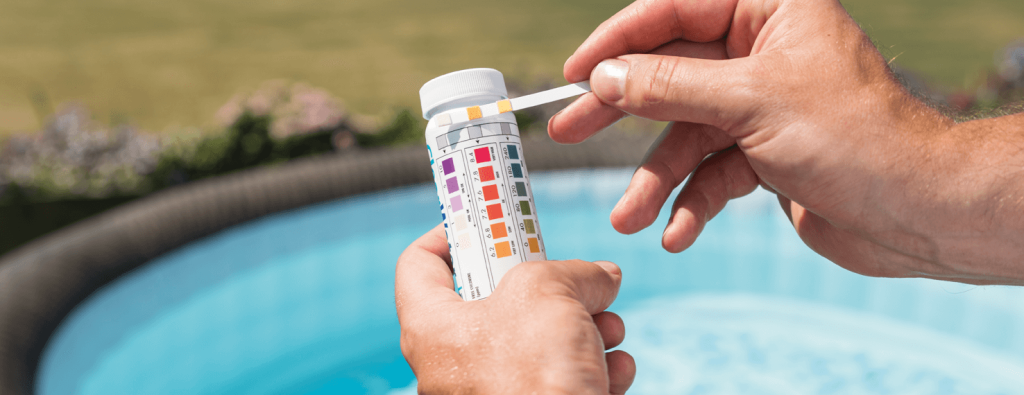
Understanding the order in which to use hot tub chemicals allows you to easily maintain water and hot tub conditions.
It all starts with checking alkalinity and pH levels. If they don’t match 80–120 ppm and 7.2–7.6 you need to add Spa Up or Spa Down.
Next, we adjust the calcium hardness level to 120–225 ppm so that the water does not harm the surface and equipment of the hot tub.
Now we are ready to protect your health and destroy all bacteria using sanitizer. You need to keep 2–3 ppm of active chlorine and 3-5 ppm of bromine.
After a week, we will fix the effect and add a hot tub shock so that the chlorine and bromine become active and can sanitize the water.
Add this in the process of using the hot tub after half a month or a month.
You can use this at any time, but only when chemical levels are adjusted, you will have a positive result.
Bonus: Hot Tub Chemical Kits
Renowned manufacturers of hot tub chemicals create kits that let you get everything all at once and cheaper. Therefore, if you use chemicals from a brand, and they triple you, it will be easier for you to order a chemical set. Next, we propose you familiarize yourself with three options.
| Name | 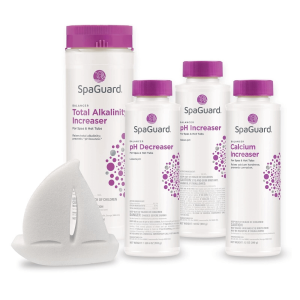 SpaGuard Chemical Balancer Maintenance Kit | 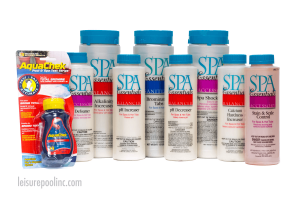 Leisure Spa Essentials Bundle Package Kit | 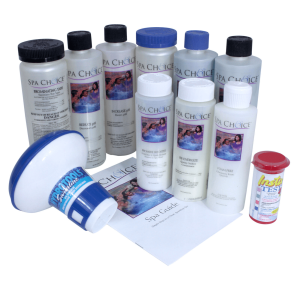 Spa Choice Standard Bromine Kit |
| Amazon rating | 4.6 | 4.6 | 4.4 |
| Kit | Scum absorber pH increaser pH decreaser Total alkalinity increaser Calcium hardness increaser 50pcs test strips (5-way) | Bromine tablets Spa shock oxidizer pH Increaser pH Decreaser Calcium hardness increaser Total alkalinity increaser Stain & scale control Spa defoamer 50pcs test strips | Defense pH increaser pH reducer Foam free Re-energizer Bromine tabs Bromine booster Metal-free Calcium increaser 10pcs test strips Floating dispenser Spa care guide |
| How much do you save? | 15% (app. $10) | 5% (app. $10) | 19% (app. $42) |
Summary
Keeping a hot tub clean is a straightforward process when you have to have a clear understanding of what kind of chemical you need and why. We’ve selected six must-have chemicals and three optional ones to keep your hot tub and your health safe.
If you missed any of the parts of the article, we suggest you familiarize yourself with how to use hot tub chemicals, detailed reviews of each of them, and three chemical kits that will allow you to save from 10% to 20% of the cost.
FAQ
❓ Do I need to shock my hot tub?
Yes. This is a crucial hot tub maintenance step because shock reanimates inactive chlorine and bromine to turn them into sanitizers.
🗓 Do I need to add chemicals to my hot tub every day?
No, you do not need to add chemicals to the hot tub each day. An overdose of chemicals will make the water too acidic. For this reason, chemicals will be ineffective, and there will be a risk of skin irritation.
🧐 Can I use a hot tub without chemicals?
No, because evaporation, environmental debris, and heat will cause sediment to occur and bacteria to grow. This will make your hot tub unsafe.
💊 Can I use my hot tub without chlorine?
Bromine is a safer alternative to chlorine, which keeps the hot tub clean and safe. However, keep in mind that bromine will sanitize water more slowly.


